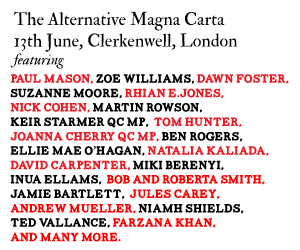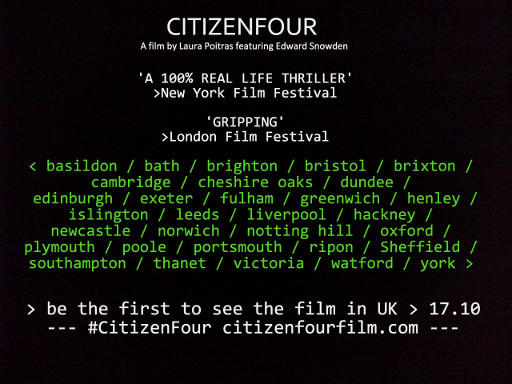The heroes of the Libel Reform Campaign
On 1 January 2014, the Defamation Act took effect across England and Wales. The Act will have a hugely positive effect on freedom of speech and better protect the public interest, fair comment and individuals from corporate bullying. But – who made this happen? This is my personal take on the individuals who are the heroes behind the Libel Reform Campaign.
My list can’t (and doesn’t) cover the 60,000 people who took the time to sign the petition, lobby their MPs and write to every newspaper in the country. Nor can it anything but touch upon the donors, 100 affiliated organisations or politicians who made the campaign a huge success. I will have no doubt forgotten hugely significant people from the list – omissions are entirely the fault of my lacklustre memory.
So in absolutely no particular order:
Victims of the law
Simon Singh @slsingh
Simon was the inspiration for and constant source of energy for the campaign. Simon’s absolute stubborn determination to do something about the state of the law during and after his case was extraordinary.
Peter Wilmshurst
A true modern hero. Dr Wilmshurst risked his family home and his professional career to speak out about a study into a medical device. Alike many of the victims of libel who joined our campaign, Dr Wilmshurst dedicated a huge amount of personal time in order to speak to politicians to persuade them to get the law right.
Ben Goldacre @BenGoldacre
Don’t talk to Dr Goldacre about vitamin pills. His case illustrated the dangers of the state of the libel law – and his unwavering support broadened the campaign considerably.
Honorable mentions: CarersWatch, Alex Hilton, John Gray, Vaughan Jones, Stuart Jones, Lesley Kemp, David Osler, Hardeep Singh.
Famous folk
Lots of famous people turn up to an event, have their photo taken and disappear. Not these lot.

Dara Ó Briain @daraobriain
My favourite Dara moment isn’t the Big Libel Gig where he gave a barnstorming performance, but him in private meetings with Ed Miliband and Lord McNally where his knowledge of the law was not only impressive, but mildly terrifying to the politicians who expected mild-mannered banter but were put on the spot.
Brian Cox @ProfBrianCox
Not only did Prof. Cox find the time to tour TV studios, but he handed in our 60,000 strong petition to Downing Street and used his Sun column to back the campaign.
Dave Gorman @DaveGorman
One of the key figures behind the Mass Rally for Libel Reform an event the then Justice Secretary Jack Straw described as the best attended he’d seen in parliament in years.
Robin Ince @RobinInce
The brilliant host (and co-organiser) of the Big Libel Gig, Robin rounded up as many of his contacts as he could to put on the greatest comedic show ever – about the law of defamation.
Honorable mentions: Marcus Brigstocke, Stephen Fry, AC Grayling, Ian Hislop, Shappi Khorsandi, Tim Minchin, Jonathan Ross, Adam Rutherford.
Journalists & Writers
Lisa Appignanesi @LisaAppignanesi
Lisa’s personal experience of the libel laws as a writer made her push for libel law reform as early as 2008 while PEN President.
Nick Cohen @NickCohen4
From the Ehrenfeld case through to Singh case and Lord Puttnam’s last minute attempt to tack Leveson into libel (and wreck the Bill), Cohen has written more than almost anyone else on why libel reform was necessary and just.
David Allen Green @JackofKent
David’s call to arms in the Wetherspoons pub (the Penderal’s Oak) in Holborn is immortalised in a plaque that now hangs on the wall. As one of the campaigning lawyers and journalists who gave impetus to the campaign he stuck with us through thick and thin.
Maya Wolfe-Robinson @mwolferobinson
Had to wade through as many op/eds on libel reform as any sane person could handle. But continued to give unstinting support to the campaign.
Honorable mentions: Jake Arnott, Guy Black, Phillip Campbell, Amanda Craig, Frances Gibb, Fiona Godley, Afua Hirsch, Natasha Loder, John Micklethwait, Alan Rusbridger, Nick Ross, John Sweeney, Craig Woodhouse, Peter Wright.
Lawyers
Robert Dougans @RobertDougans
Simon Singh’s lawyer first and foremost but also the defender of a long list of other worthy folk. Dougans is a one-man free speech engine.
Mark Lewis @MarkLewisLawyer
Defended the Owlstalk bloggers and Dr Peter Wilmshurst from libel actions. An endless source of knowledge, time and ideas for the campaign.
Adrienne Page @PageAdrienne
Gave the campaign exceptionally useful advice during the passage of the Defamation Bill especially on how to improve the public interest defence.
Gill Phillips @ladywell23
Endless good advice and practical examples of how the law chilled responsible journalism.
David Price
An enormous help to the campaign in refining our position on costs, the public interest defence and in a number of other key areas.
Stephen Sedley
Chair of the Alternative Libel Project. His sensible stewardship has made cheap alternatives to a full trial possible.
Mark Stephens @MarksLarks
Gave a significant amount of his time to the original report and subsequently to promoting libel reform within the legal profession.
Honorable mentions: Alistair Brett, Joanne Cash, Harvey Kass, Caroline Kelly, David Marshall, Gavin Millar, Brian Neill, Marcus Partington, Jonathan Price, Heather Rogers, Pia Sarma.
Campaigners
People who gave their time. For free.
The Geek Calendar @geekcalender
The nerds (as a compliment) who launched Geek Calendar not only made the must-have calender of 2011, but raised thousands of £s for the campaign. Special thanks to the organisers Mun-Keat Looi (@ayasawada); Alice Bell, Louise Crane and the production team Ben Gilbert, Greg Funnell; Cosima Dinkel; Greg Foot, Barry Gibb, Tom Ziessen.
Tracy King @tkingdoll
The co-organiser (and inspiration for) the Big Libel Gig, a huge sell out show in front of over 2,000 people in London’s Palace Theatre. Tracy’s gig was a massive success that fired a rocket up the politicians.
Honorable mentions: @noodlemaz, @rebeccawatson, @davepaton
Scientists, NGOs, campaign groups
Justine Roberts (@Justine_Roberts) & Rowan Davies (@RowanDavies), Mumsnet
Mumsnet’s Justine Roberts donated a staggering £12,500 to the Libel Reform Campaign and kept her organisation behind the campaign through the whole 4 year period.
Charmian Gooch, Global Witness
Global Witness’s evidence to parliamentarians made a huge difference in persuading the government to update and improve the public interest defence.
Honorable mentions: Emma Ascroft (Yahoo!), Kate Briscoe, David Colquhoun, Richard Dunstan (Citizens Advice), Francisco Lacerda, Antony Lempert (British Medical Association), Richard Mollet (Publishers Association) Dalia Neild, Bob Satchwell (Society of Editors).
Politicians
You only ever hear bad stuff about politicians. This group of politicians put party-politics aside and made a big difference.
Lord Lester
The “grandfather” (in his own words) of the Defamation Act. Without Lord Lester’s private members bill, none of this may have been possible. His private bill showed that placing important defences into statute was feasible and created a vehicle for the final Act of Parliament.
Dr Evan Harris MP @drevanharris
I may have an absolutely fundamental disagreement with Evan over Leveson, but frankly without his tireless commitment to the campaign and sage advice the campaign would not have been such a success. A truly fearsome campaigner.
Lord McNally
Did what he said he would — as Justice Minister he delivered the first wholesale reform of the law since 1843.
Sadiq Khan MP @sadiqkhan
Labour’s shadow Justice Secretary really kept the pressure on the government to improve the Defamation Bill throughout the parliamentary process. Sadiq scored a big victory in reducing the ease with which corporations can sue for libel.
Paul Farrelly MP @PaulFarrelly
Paul founded the All Party Parliamentary Group on Libel Reform which helped coordinate sympathetic MPs to push for libel reform.
Lord Mawhinney
As Chair of the Joint Scrutiny Committee of the draft Defamation Bill, he oversaw a scrutiny process that enhanced and strengthened the Defamation Bill (rather than, as we feared, may have weakened it).
John Whittingdale MP
His Committee’s important report (Culture, Media and Sport Select Committee) into libel significantly increased the momentum in parliament for reform.
Honorable mentions: Lord Allan, Baroness Bakewell, Lord Bew, Peter Bottomley MP, Lord Browne, Viscount Colville, David Davis MP, Paul Farrelly MP, Rob Flello MP, Lord Grade, Dominic Grieve, Baroness Hayter, Julian Huppert MP, Lord Macdonald, Baroness O’Neill, Jack Straw MP, Lord Taverne, Lord Willis of Knaresborough, every MP who signed EDM 1636 and EDM 423.
The professionals
Every campaign needs people to actually do stuff. At the core of the campaign were 3 amazing groups you should support (English PEN @englishpen; Index on Censorship @IndexCensorship; Sense About Science @senseaboutsci). Here are their humans:
Tracey Brown, Jo Glanville, Jonathan Heawood (@jheawood), John Kampfner (@jkampfner), err me Mike Harris (@mjrharris), Síle Lane and Robert Sharp (@RobertSharp59).
Honorable mentions: Chris Peters, Padraig Reidy.
Oh, and a warning from history
Just a note of caution.
The Report recites in non-technical language the general criticisms of the present law, and lists them as complication, cost, uncertainty, stifling of public discussion, undue severity upon unintentional defamation and bias in favour of ” gold-digging ” plaintiffs.
That report was not Free Speech Is Not For Sale but the Porter Report of 1948 which recommended reform to the law of libel which culminated in the Defamation Act 1952. Sixty years on, after initial progress, reform was required once more.
One sentence from the Porter Report, as noted by Selwyn Lloyd MP in The Spectator’s archive, will stand out for seasoned Leveson-watchers:
The Report abhors what it calls “Group Defamation,” for example, the vilification of a particular race or creed or party, but considers that any attempt to go beyond the present law as to seditious libel would curtail free political discussion.
The Libel Reform Campaign essential reading list
‘Free Speech Is Not For Sale’ (November 2009)
http://www.libelreform.org/our-report
‘Reforming libel – what must a Defamation Bill achieve?’ (September 2010)
http://www.libelreform.org/news/471-reforming-libel-what-must-a-defamation-bill-achieve
‘Libel Reform Campaign – Evidence to Joint Committee on the Draft Defamation Bill ‘ (May 2011)
http://www.senseaboutscience.org/data/files/LRC_submission_to_Joint_Ctt__cover_note_2011_may_25.pdf
‘Libel Reform Campaign – initial analysis of the Defamation Act’ (April 2013)
http://www.senseaboutscience.org/data/files/Libel/Libel_Reform_Campaign_-_Initial_asssesment_of_the_Defamation_Act.pdf
Northern Ireland
‘Libel Reform Campaign – Evidence to the Northern Ireland Assembly’s Finance and
Personnel Committee ‘ (July 2013)
http://www.niassembly.gov.uk/Documents/Finance/Defamation-Act/written-submissions/Libel-Reform-Campaign-Defamation-Act-submission.pdf
‘Libel Reform Campaign response to the proposed Private Member’s Bill on the law of defamation in Northern Ireland ‘ (November 2013)
http://libelreform.org/images/lrcmikenesbitt.pdf
Alternative dispute resolution
‘Alternative Libel Project – Final Report’ (March 2012)
http://www.englishpen.org/wp-content/uploads/2012/03/Alternative_Libel_Project_FinalMarch2012.pdf






